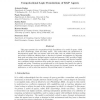Free Online Productivity Tools
i2Speak
i2Symbol
i2OCR
iTex2Img
iWeb2Print
iWeb2Shot
i2Type
iPdf2Split
iPdf2Merge
i2Bopomofo
i2Arabic
i2Style
i2Image
i2PDF
iLatex2Rtf
Sci2ools
147
click to vote
JAIR
2008
2008
Computational Logic Foundations of KGP Agents
This paper presents the computational logic foundations of a model of agency called the KGP (Knowledge, Goals and Plan) model. This model allows the specification of heterogeneous agents that can interact with each other, and can exhibit both proactive and reactive behaviour allowing them to function in dynamic environments by adjusting their goals and plans when changes happen in such environments. KGP provides a highly modular agent architecture that integrates a collection of reasoning and physical capabilities, synthesised within transitions that update the agent's state in response to reasoning, sensing and acting. Transitions are orchestrated by cycle theories that specify the order in which transitions are executed while taking into account the dynamic context and agent preferences, as well as selection operators for providing inputs to transitions.
Related Content
| Added | 12 Dec 2010 |
| Updated | 12 Dec 2010 |
| Type | Journal |
| Year | 2008 |
| Where | JAIR |
| Authors | Antonis C. Kakas, Paolo Mancarella, Fariba Sadri, Kostas Stathis, Francesca Toni |
Comments (0)

